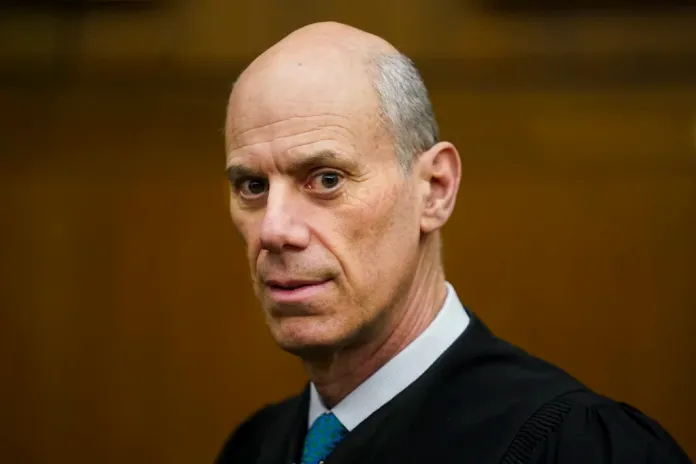


Federal courts are pausing high-profile civil lawsuits against the Trump administration in response to the government shutdown that began early Wednesday, as agencies begin cutting back on non-essential legal work to conserve resources.
The Justice Department announced that while criminal prosecutions will continue uninterrupted, the shutdown “effectively eliminated” its ability to handle most civil litigation. One such case involves legal challenges to Trump’s policy restrictions on homelessness and domestic violence grants. In a Rhode Island lawsuit over federal grant terminations, DOJ lawyers told the court they “regret the necessity” of asking for a pause in proceedings due to the funding lapse.
Recommended Stories
- Trump eyes next targets as Comey charges foreshadow more indictments
- Scholars debate Democrats' favorite Trump attack line: Are we in a 'constitutional crisis'?
- Pennsylvania GOP defectors push gun control bill across finish line in state House
Chief Judge James Boasberg of the U.S. District Court for the District of Columbia issued a two-page standing order on Wednesday granting blanket deadline extensions for most civil cases involving the federal government. The goal, Boasberg said, is to preserve the court’s “scarce judicial resources” and preempt a flood of case-specific motions to delay proceedings.

“The Court has a need to minimize expenditures of scarce judicial resources on large volumes of case-specific motions to stay or extend pending deadlines,” Boasberg wrote, adding that the lapse in appropriations constitutes “good cause” for extending timelines.
While the judiciary itself remains open, the administrative arm of the federal courts wrote in a memorandum Wednesday that current funding reserves will only sustain paid operations through Oct. 17. Courts rely on fee balances and prior-year appropriations during shutdowns, but recent budget stagnation has tightened margins.
The judiciary’s memo, signed by U.S. District Judge Robert Conrad, assured employees they will receive pay on Oct. 10 and 24. However, if funding runs out after that, essential personnel, including law clerks, probation officers, and court reporters, may be forced to work without pay under the Anti-Deficiency Act. Judges and Supreme Court justices will continue to be paid under constitutional guarantees.
Additionally, the threat of furloughs for judiciary personnel is slim so long as the shutdown does not persist for weeks. The judiciary was last forced to furlough employees during the shutdown that lasted 21 days between 1995 and 1996 under then-President Bill Clinton, according to the Brookings Institution.
Chief Judge John McConnell, an Obama appointee in Rhode Island, said if the situation persists, his courthouse will reduce operations to a four-day workweek and close one day weekly.
“It is so burdensome trying to figure out how we operate a co-equal branch of government that has constitutional responsibilities without appropriated funds,” McConnell said, according to Reuters.
Trump DOJ reverses course on immigration courts precedent
Breaking with precedent, the Trump administration said it will continue non-detained immigration court hearings during the shutdown. In its fiscal 2026 contingency plan published Monday, the DOJ cited the “national emergency” declared by President Donald Trump over illegal immigration and emphasized the backlog of more than 4 million pending immigration cases.
Immigration courts are separate from the federal judiciary and are operated by the DOJ.
Still, it marks a departure from prior shutdown responses, where non-detained immigration hearings were routinely suspended. Detained cases will continue consistent with statutory speedy trial requirements and public safety priorities.
Civil suits paused, but criminal cases move forward
Under the DOJ’s contingency plan, 89% of employees are exempt from furlough in the first five days of a shutdown. Prosecutors are expected to remain focused on criminal cases, but civil enforcement will largely be paused, especially lawsuits against Trump’s policy decisions.
Several new cases were already subject to stay motions by the government this week, including lawsuits over voter registration data requests and funding cuts for social programs. DOJ attorneys in multiple filings expressed “regret” for the disruption caused by the funding lapse.
GOVERNMENT SHUTDOWN: LIVE UPDATES FROM CONGRESS AMID FUNDING STALEMATE
However, some courts continued work on Trump policy-related suits after the government shutdown on Wednesday. In an order from U.S. District Judge Lewis Kaplan in New York, the judge blocked the Trump administration’s efforts to revoke and reallocate $34 million in public transport counterterrorism funds in response to the state’s immigration sanctuary policies. Kaplan, a Clinton appointee, placed a restraining order on reallocating those funds until Oct. 15.
Despite the delays, the Supreme Court is still set to open its new term Monday and proceed with arguments. But lower courts, especially in civil cases involving the federal government, are preparing to downshift dramatically if lawmakers do not break the funding stalemate soon.
